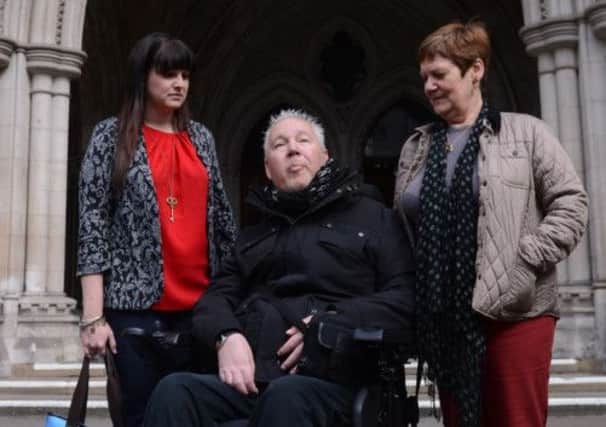Leeds victim’s ‘right to die’ plea goes to Appeal Court


The Lord Chief Justice, Lord Judge, sitting with two other judges in London, made the comments at the outset of the latest round of legal action started by Tony Nicklinson, who died at home in Melksham, Wiltshire, a week after he lost a High Court bid in August to end his life with a doctor’s help.
His widow Jane vowed to continue the battle in the courts, which she said was “part of Tony’s legacy”.
Advertisement
Hide AdAdvertisement
Hide AdLord Judge, sitting with the Master of the Rolls Lord Dyson and Lord Justice Elias, will hear argument in three cases over the course of several days.
He said: “We are acutely aware of the desperate situation in which the appellants find themselves, and we are very sympathetic.”
But he stressed that “we cannot decide this case as a matter of personal sympathy”.
It has to be decided on the “basis of principles of law” after the court has heard all sides.
Advertisement
Hide AdAdvertisement
Hide AdAs well as a challenge by Mrs Nicklinson against the High Court’s ruling, the judges will hear submissions on behalf of paralysed road accident victim Paul Lamb, 57, from Leeds - who won the right to join the litigation to continue the fight started by Mr Nicklinson.
They will also be hearing a challenge by another man, whose case was rejected at the High Court on the same day as Mr Nicklinson’s.
The locked-in syndrome sufferer, who cannot be identified for legal reasons but is referred to as “Martin”, suffered a massive stroke in August 2008. He is unable to speak and virtually unable to move, describing his life as “undignified, distressing and intolerable” - and wants to be allowed a “dignified suicide”.
Mr Lamb is immobile except for limited movement in his right hand and has been in significant pain since the 1990 tragedy.
Advertisement
Hide AdAdvertisement
Hide AdThe former builder and father-of-two wants a doctor to help him die in a dignified way, preferably by a lethal injection, with his family around him in his own home. He says he feels worn out and fed up with going through the motions of life rather than living it.
Mr Lamb, who is present in court for the hearing, said before it began that he hoped the judges would listen.
He said: “I’m not confident because I’ve seen the legal system. It’s already failed people.
“You can never be confident. I feel the legal system doesn’t listen and I think they should listen more.”
Advertisement
Hide AdAdvertisement
Hide AdHe added: “They will listen today is what I’m hoping. I’m confident in my solicitor and barrister. I think the public will sympathise. Definitely.”
Mrs Nicklinson, who is also in court, commented yesterday: “We are really excited that we are back in court and hopeful that we will win the appeal and have the case heard again.
“We are hoping that the judges will see that we didn’t get a fair hearing last time and that we should get the case heard again. We feel that our case wasn’t properly heard.”
Mr Nicklinson, who was paralysed by a stroke while on a business trip to Athens in 2005, had refused food and contracted pneumonia after he was “devastated” by the decision of Lord Justice Toulson, Mr Justice Royce and Mrs Justice Macur.
Advertisement
Hide AdAdvertisement
Hide AdHe had sought declarations that there should be a defence of necessity available to a doctor assisting him to die, and that the law was incompatible with his right to respect for private and family life under Article 8 of the European Convention on Human Rights, which he argued includes a right to autonomy and self determination at the end of life.
Paul Bowen QC, representing Mrs Nicklinson and Mr Lamb in their cases against the Ministry of Justice, told the appeal judges that the High Court had “rejected the claims because, in summary , it considered Parliament, not the courts, should be responsible for changing the law in this area”.
He said the High Court “did not decide the substantive issues at the heart of the claims” of whether the current law does “disproportionately interfere” with the appellants’ Article 8 rights, nor whether the defence of necessity is available to a doctor providing the assistance to die.
Mr Bowen said: “This appeal is about the constitutional issues, not the substantive issues.
Advertisement
Hide AdAdvertisement
Hide Ad“If the appeal is successful on those constitutional issues, the appellants seek an order setting aside the order of the Divisional Court, ordering a retrial and remitting the matter back for the substantive issues to be determined...”
Law firm Bindmans said Mrs Nicklinson has taken over the Article 8 claims in her own right and as the administrator of the estate of her late husband.
Mr Lamb is pursuing the Article 8 claims in his own right and a claim that the common law defence of necessity should be available to a charge of murder where a doctor assists a person such as himself to end his life.
Leigh Day, the solicitors representing 48-year-old Martin, say that in his case they will argue that there should be a change to the approach taken to prosecution for assisted suicide as, although it is legal to commit suicide, it is a serious criminal offence to assist someone to take their own life.
Advertisement
Hide AdAdvertisement
Hide AdLeigh Day said current Director of Public Prosecution (DPP) guidance makes it clear that friends or family members would be unlikely to be prosecuted.
But Martin’s wife does not wish to be actively involved in the steps necessary to bring about his death and so he needs the assistance of a professional, most likely a doctor, nurse or a carer, to help him to die.
The law firm said that currently the DPP policy does not make it clear that such people are unlikely to be prosecuted.